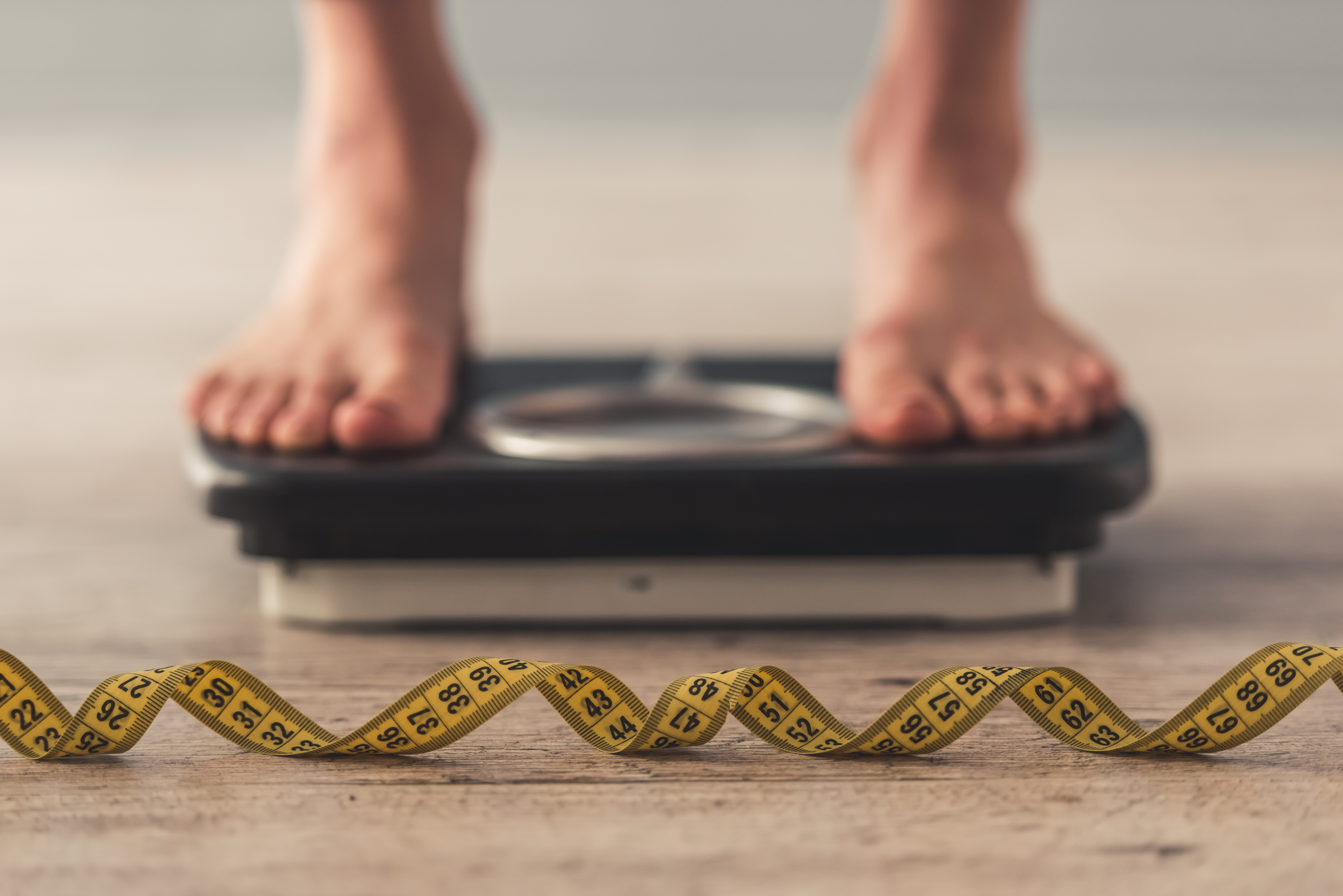Recent research shows that without a constant maintenance plan, those who lose weight soon settle back into old habits and revert back to unhealthy lifestyles. This results in back-stepping or possibly even going back to the starting point. In 2010, a Penn State College of Medicine study discovered nearly 85% of people regain most, and often all, of the weight lost. This can be for a number of reasons. Some are because of lack of motivation, stress, life changes, or the weight was lost too rapidly, making their losses impossible to maintain.
Keeping the weight off becomes easier and helps you stay ahead of the game if you lose the weight in a healthy and slower manner. Once the weight is gone, you can make specific changes to your habits and mindset to keep those pounds gone. To lose weight in a healthy manner, these tips can help you, but first, we must break down the difference between BMI and body composition.
What Is the Difference Between BMI and Body Composition?
BMI, or Body Mass Index, has long been held as the standard for measuring our weight in relation to our height. The score we get tells us if we are underweight, normal weight, overweight, or obese.
Alternately, body composition is a different, more comprehensive way to understand the body—not just whether you are "normal" or "overweight." That is why body composition matters more if you're trying to be healthy.
What Is BMI?
Your BMI is determined by dividing your weight by the square of your height. A BMI in the “normal” range falls between 18.5 and 25. That means that if you’re 5’10”, you’ll want to weigh about 130-175 pounds.
The problem with BMI is that the formula fails to account for many other important factors. With the simplicity of the calculation, BMI was never really designed to do more than tell us a range of normal weight for our height.
What Is Bigger, a pound of fat or a pound of muscle?
Muscle is significantly denser than fat, meaning 10 pounds of muscle takes up much less space than 10 pounds of fat.
So, what does this mean for the average person looking to stay healthy? If you fall into the average category, not particularly athletic but not overweight either, then BMI can offer a reasonably accurate representation of your weight in relation to your height. However, if you have an athletic build or lead a predominantly sedentary life, the BMI might not provide an accurate picture. Below is a basic BMI scale for reference:
- Underweight: Below 18.5
- Normal Weight: 18.5-25
- Overweight: 25-30
- Obese: Over 30
Athletic individuals generally have very low body fat percentages (5-10%). Clearly, athletes with BMIs over 25 are not overweight. They are in shape and athletically fit. Compare this to an individual who sits behind a desk every day. This person may be aware of their weight and try to avoid gaining weight by eating healthy but not exercising regularly. If this person is 5’6” and weighs 130 pounds, they have a BMI score of 21. This score is in the normal BMI range.
Critics say BMI is too broad, its results are inaccurate, and it doesn’t really tell you anything about your body composition. For this reason, BMI has been coming under increased fire for its failure to give us a more detailed picture.
The History of BMI (And Why It’s Flawed)
BMI was developed in the early to mid-1800s by a Belgian scientist named Adolphe Quetelet. He envisioned a simple way to determine whether or not a person was overweight. For almost 200 years, it has remained the standard that medical professionals often turn to when researching obesity.
The World Health Organization still uses it as the standard for recording obesity statistics. It’s also used to examine trends. It works for getting a general feel of the overall health and well-being of a city or a nation, but BMI should never be used to assess health on an individual level. There are simply too many flaws in this evaluation.
One of the most famous examples of those flaws is Arnold Schwarzenegger. When he was in the prime of his bodybuilding career, he was 6’0” and weighed 235 pounds. This gave him a BMI of 31, putting him in the obese range. We know there are many words that can be used to describe his physique, but “obese” is definitely not one of them.
What Is Body Composition?
We know that BMI provides an incomplete health and wellness picture. So, how do we get the full picture? Body composition. Body Composition is the amount of fat, Lean Body Mass, and water in your body. When you measure body leanness, you have to account for these factors—it can’t be just height and weight.
Essentially, body composition explains how much of your body is made up of:
- Fat
- Lean mass
- Water
- Everything else
If you’re interested in living a longer and healthier life, body fat percentage and lean muscle mass matter more than just your weight and BMI.
Body composition can be determined by bioelectrical impedance analysis, or BIA, which sends an electrical signal through your body. Based on how that signal interacts with your body's fat, muscle, and other elements, the device can separate your weight into, at a minimum, fat mass and lean body mass.
Our SECA device goes further and provides results for skeletal muscle mass in each limb, visceral fat, and body water (intracellular and extracellular). It is time to start thinking of your weight in terms of what it is made up of (i.e., body composition).
Overall, tracking body fat percentage and lean muscle mass isn’t just about looking good—it’s about living longer and healthier. High body fat percentage increases the risk of many illnesses, including diabetes and cardiovascular disease.
With a complete picture of your body composition, you’ll be able to determine if you have a high, medium, or low body fat percentage. If it is high, you will want to focus on decreasing your fat mass. If your body fat percentage is normal, but your overall muscle mass is on the lower end, then working on building muscle strength and size is needed.
Although BMI has been used for a long time to assess weight, it’s time that we start tracking full body composition.
Body composition is neither a fad nor a trend in the health and wellness industry. Body fat percentage and Lean Body Mass have been well-studied and discussed in scientific literature for decades. Figure yours out, and you’ll be well on your way to a healthier, happier you.
Strategies for Achieving Your Optimal Body Composition
- Include more fiber in your diet: Fiber is important to your health. It stays longer than the other substances you eat and keeps you full for longer, which will help control your appetite. Fiber helps move fat from your digestive system faster so that less fat will be absorbed. Fiber helps to keep your bowel movements regular. Fiber can be found in bread and a variety of vegetables.
- Control intake of calories and fat: Cut down the intake of calories by staying away from foods full of sugars, soda, and wine. Avoid fatty foods such as burgers, cheese, and fried foods, as these are highly processed foods. Instead, include fruits, vegetables, and whole grains in your diet. These are absorbed slowly and satisfy your hunger, whereas highly processed foods are slow in nutritional value and don’t make you feel satisfied, so you eat more of them.
- Drink water: Water is one of the best sources to lose weight. If your body gets dehydrated, it sends signals to the brain, and it is misinterpreted as hunger signals. Therefore, you eat food instead of drinking water. That’s why you have to drink enough water throughout the day to keep yourself hydrated and prevent dehydration, constipation, slower metabolism, and decreased energy.
- Eat smaller meals: Eat smaller meals instead of one longer meal. Split three larger meals into six smaller meals. Eating frequently prevents your hunger and provides consistent energy. Your metabolism functions properly. Don’t skip your meals, as it slows down your metabolism.
- Take 10,000 steps daily: Check the total number of steps taken daily. Buy a pedometer and watch how many steps you are taking daily. Taking 10,000 steps equals a regular exercise workout or walking four miles. If you are taking 10,000 steps every day, it will help you burn calories and lose weight.
- Adequate sleep: Many people don’t get the amount adequate sleep of eight hours daily. Your body needs sufficient rest to burn calories. Lack of sleep makes you drowsy and lethargic in the daytime. It increases your hunger and makes you prone to cravings, which results in excess weight. You are prone to sweets, chocolates, ice creams, and other fatty foods. Lack of sleep decreases leptin production, which tells the body to burn calories. Therefore, sleep is essential to lose weight and for better health.
- Reduce stress: Stress can lead to an increase in weight. Reduce stress by diverting your mind with books, taking a hot bath, listening to calm music, playing with your kids, or watching a movie.
Strategies for Maintaining Your Optimal Body Composition
Once you see that magic number on the scale, it is essential you do not stop the healthy living habits. It is like quitting smoking and then buying a pack of cigarettes to celebrate. You can't do that. It just does not make sense. So let us help by giving you five ways to make your weight loss success a lasting one.
- Be Patient With The New You: If you feel anxious about going out and socializing in your new, improved body, remind yourself that you’ve found your way to a healthy weight, and now you’re finding out how to get comfortable in your own skin. During this identity shift, show yourself the same level of care and compassion you would show a best friend who’s going through a big life change.
- Avoid Triggers: While you were losing all that weight, you may have consciously avoided certain situations, such as eating out with friends. Be mindful that you might be able to indulge once in a while now. However, your old triggers are probably still triggers. People often have had to change friends or say goodbye to activities they once loved to ensure this healthy lifestyle.
- Focus on Protein and Fiber: It is important to remain diligent about nutrition and balance. The key here is ensuring you’re eating enough whole, unprocessed foods. Emphasize the importance of protein and fiber because these foods quiet your body's “hunger-generating” hormones.
- Eat Intuitively: Processed foods, desserts, and alcohol aren’t totally off-limits as you work to maintain your weight. However, pay attention to how your body feels before, during, and after consuming them. This is called intuitive eating, and it’s a powerful tool in maintaining a healthy weight.
- Exercise Regularly
Of course, even all these strategies combined aren’t going to be able to offset a sedentary lifestyle. To make your weight loss permanent, you must keep up an exercise routine you enjoy. If you slow down, so will your body’s metabolism. Your body’s daily caloric requirement is determined in part by how much you move daily. When you become inactive, you burn fewer calories throughout the day, and your metabolism responds by slowing down. Low levels of daily physical activity can also lead to illness and depression, which further zap your energy. But the biggest impact exercise has on your weight-maintenance efforts has less to do with calories than with fitness.
You Don’t Need to Do It Alone
At TransformYou, we do everything we can to help you live healthily. Whether it is medical weight loss, men's health, women's health, pain management, or our personal training services, Dr. Bird and the rest of our team are here for your specific needs. However, we want to help our clients understand that hitting your goal weight is not the finish line. In fact, you are only halfway there after shedding those pounds. There is continual work needed to keep the pounds off. And keep them off for good.
If you are ready to Transform yourself, so are we. Check out our Weight Loss Packages or Schedule a consultation with one of our licensed physicians to get started today.
Read next in Men’s Health

7 Ways Testosterone Replacement Therapy Can Transform Your Daily Life
By Dr. Robb Bird

Natural Ways to Boost Testosterone Levels: Diet, Exercise, and Lifestyle
By Dr. Robb Bird

How Peptide and Hormone Therapy Work Together for Better Health
By Dr. Robb Bird
Medically reviewed by Dr. Robb Bird, NMD FAARM
Medical Director, Transformyou
